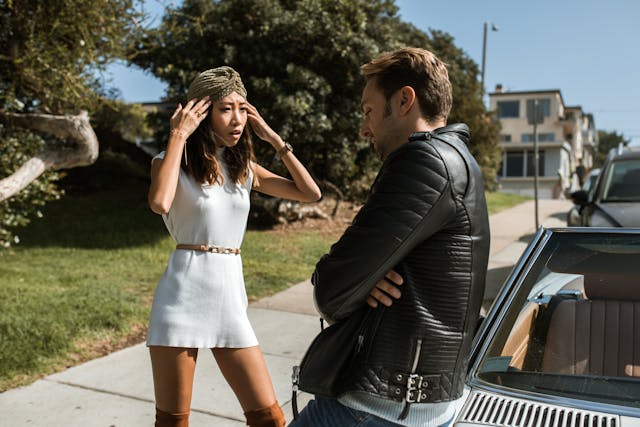Relationships thrive on effort, attention, and emotional investment — that’s not exactly rocket scientist.

However, when you’ve been with someone for a while and get a bit too comfortable, you might start giving your partner the “leftovers” without realising it — whatever energy, patience, or affection you have left after everything else in your life. If your relationship has started feeling like an afterthought rather than a priority, it might be time to check in with yourself before you do serious damage. Here’s how you know that your partner is getting what’s left instead of your best.
1. You’re always too tired to engage with them properly.

By the time you get to your partner at the end of the day, you’re completely drained. You might zone out when they talk, give half-hearted responses, or default to scrolling on your phone instead of engaging. Even when they try to connect, you struggle to muster up the energy to participate fully. Feeling tired is normal, but if your partner consistently gets the most exhausted version of you while everyone else gets your focus and effort, it can take a toll. Making time to truly be present, even in small ways, can help keep the connection strong.
2. Your quality time together is always an afterthought.

Spending time together only happens when it conveniently fits into your schedule, rather than being something you intentionally make space for. You rarely plan special moments, and when you do hang out, it’s often in a distracted or passive way, like watching TV without real interaction. Quality time isn’t just about being in the same room; it’s about actively connecting. If your partner constantly has to work around your schedule or take whatever time they can get, they might start feeling like they’re not a real priority.
3. You show more patience with other people than with them.

You manage to stay calm and composed at work, with friends, or even with strangers, but the smallest things your partner does irritate you. They might ask a simple question, and you respond with frustration, or they try to have a conversation, and you shut it down without thinking. When your partner gets the least of your patience, it can create a sense of emotional imbalance. If you wouldn’t react that way to a colleague or friend, it might be worth asking why your partner isn’t getting the same courtesy.
4. They don’t get the same emotional energy you give everyone else.

You might be the go-to person for emotional support among friends, always ready to listen and offer advice. But when your partner needs the same from you, you feel too drained to engage or dismiss their concerns quickly. Emotional availability is crucial in a relationship, and if your partner feels like everyone else gets the warm, supportive version of you while they get the empty, distracted one, resentment can build. Making space for their feelings is just as important as making space for anyone else’s.
5. You prioritise work, hobbies, or social plans over them.

While it’s healthy to have a full life outside your relationship, it becomes a problem when your partner is always at the bottom of the list. If work deadlines, social plans, or personal interests consistently take priority over time together, they might start feeling neglected. Relationships need balance, and while your partner shouldn’t be your only focus, they shouldn’t always come last either. If they have to fight for a place in your life, they may start questioning how much they truly matter to you.
6. You rely on them for comfort but don’t offer the same in return.

When you’ve had a bad day, you turn to your partner for support, venting about your frustrations and looking for reassurance. But when they need the same, you feel too drained to engage, or you brush it off as not a big deal. A relationship should be a space where both people feel heard and supported. If you’re taking but not giving, your partner may start feeling like they’re carrying more of the emotional weight, which can eventually lead to burnout and resentment.
7. You go through the motions without real effort.

You do the basics — responding to texts, showing up for plans, saying “I love you” — but there’s no real thought or energy behind it. It’s more about keeping the routine going than truly engaging with them in a meaningful way. Relationships need more than just maintenance to thrive. If everything feels like a checklist rather than something you genuinely enjoy and invest in, it might be time to reflect on what’s holding you back from being fully present.
8. You rarely check in on how they’re feeling.

Days or even weeks might pass before you genuinely ask how they’re doing beyond surface-level conversations. You assume they’re fine because they haven’t said otherwise, but you’re not actively making the effort to check in. Small moments of care and interest go a long way. If you regularly ask friends or colleagues about their lives but rarely ask your partner how they’re feeling, it might be a sign they’re getting your emotional leftovers.
9. You save your best self for other people.

At work or in social settings, you’re upbeat, engaged, and full of energy. But when you get home to your partner, you shut down, disengage, or seem uninterested. It’s like they only see the exhausted version of you while everyone else gets the best parts. It’s natural to let your guard down around your partner, but if they never get to experience the happy, fun, or excited side of you, it can make them feel unimportant. Bringing some of that same energy home can help rebalance things.
10. They hesitate before asking for your attention.

If your partner seems unsure about whether they should approach you or looks for the “right time” to bring something up, it could be a sign that they feel like an afterthought. They might sense that you’re too distracted or tired to really listen. A healthy relationship involves open and comfortable communication. If your partner feels like they need to “earn” your attention, it could mean they don’t feel fully valued in the relationship.
11. You’re always multitasking when you’re with them.

Conversations happen while you’re scrolling your phone, watching TV, or thinking about work. Even when you’re technically spending time together, you’re not fully present, and your focus is elsewhere. Multitasking can make your partner feel like they’re not worth your undivided attention. Making the effort to put distractions aside, even for a short while, can make them feel more appreciated and connected.
12. They don’t get thoughtful gestures from you anymore.

At the beginning of the relationship, you might have done little things to show you cared—sending sweet texts, planning small surprises, or remembering their favourite things. But now, those gestures rarely happen. After a while, effort can slip without realising it, but small acts of thoughtfulness help keep the connection alive. Even something as simple as a genuine compliment or picking up their favourite snack can make a difference.
13. You assume they’ll always be there, no matter what.

If you find yourself taking your partner for granted, expecting them to be patient and understanding, no matter how much effort you put in, it could be a sign that they’re getting your leftovers. While love should be steady, it’s not something to be neglected. Just because your partner is loyal doesn’t mean they don’t need attention and care. Relationships require ongoing effort from both sides to stay fulfilling and healthy.
14. You rarely express appreciation for them.

Your partner does things for you, supports you, and is there when you need them, but you don’t often acknowledge it. Over time, they might start feeling like their efforts are unnoticed or unappreciated. A simple thank you, a genuine compliment, or a moment of appreciation can go a long way. If you expect them to be there but rarely acknowledge what they bring to your life, they may start feeling emotionally drained.
15. You wouldn’t want to be on the receiving end of what you’re giving.

At the end of the day, ask yourself: if your partner treated you the way you’re treating them, would you feel loved and valued? If the answer is no, it might be time to reassess how you’re showing up in the relationship. Relationships aren’t about perfection, but they do require balance and care. If you’ve realised you might be giving your partner the leftovers, making small but intentional changes can help rebuild that connection.




